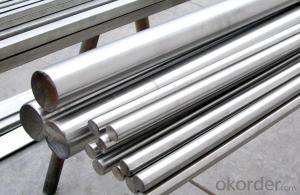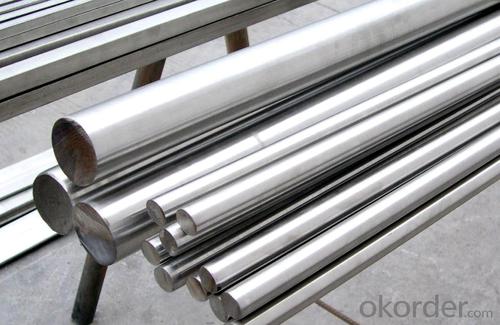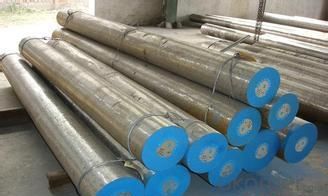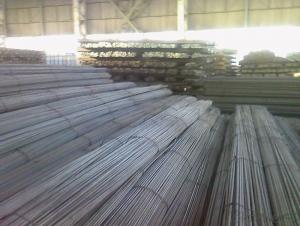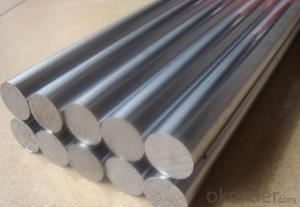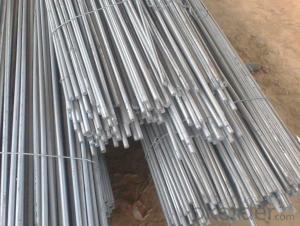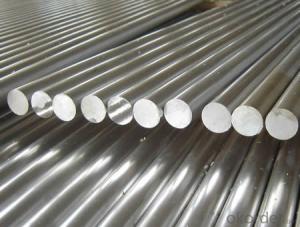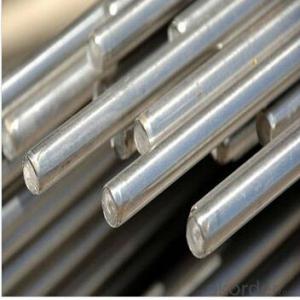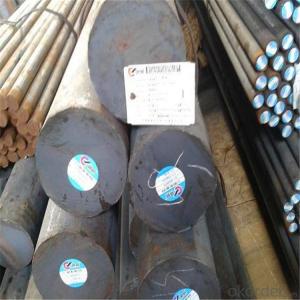Forged Spring Steel Round Bar with the Size 20mm
- Loading Port:
- Shanghai
- Payment Terms:
- TT or LC
- Min Order Qty:
- 20 m.t.
- Supply Capability:
- 500 m.t./month
OKorder Service Pledge
OKorder Financial Service
You Might Also Like
Product Description:
OKorder is offering Forged Spring Steel Round Bar with the Size 20mm at great prices with worldwide shipping. Our supplier is a world-class manufacturer of steel, with our products utilized the world over. OKorder annually supplies products to European, North American and Asian markets. We provide quotations within 24 hours of receiving an inquiry and guarantee competitive prices.
Product Applications:
Forged Spring Steel Round Bar with the Size 20mm is widely used to make the bearing used in automobile, tractor engine, transmission and the wheel. And it also used to make the main bearing for the machine tools, electrical machinery, mining machinery, electric locomotives,mechanical ventilation and high speed of grinding wheel spindle etc
Product Advantages:
OKorder's Forged Spring Steel Round Bar with the Size 20mm with High Quality are durable, diversified and qualified.
Main Product Features:
· Premium quality
· Prompt delivery & seaworthy packing (30 days after receiving deposit)
· Can be recycled and reused
· Mill test certification
· Professional Service
· Competitive pricing
Product Specifications:
Manufacture: Hot rolled
Grade: 20CrNiMoA 20CrNi2MoA 16Cr2Ni4MoA 12Cr2Ni3Mo5A 20Cr2Ni4A 20Cr2Ni2MoA
Cr4Mo4V Cr15Mo4 W9Cr4V2Mo W18Cr4V W6Mo5Cr4V2 5CrMnMo 60CrMnMoNi 37CrA 55SiMoVA etc
Certificates: ISO, SGS, BV, CIQ
Length:6m 8m 9m 12m
Packaging: Packed in bundles with standard export sea-worthy package or as customer require
FAQ:
Q1: Why buy Materials & Equipment from OKorder.com?
A1: All products offered byOKorder.com are carefully selected from China's most reliable manufacturing enterprises. Through its ISO certifications, OKorder.com adheres to the highest standards and a commitment to supply chain safety and customer satisfaction.
Q2: How do we guarantee the quality of our products?
A2: We have established an advanced quality management system which conducts strict quality tests at every step, from raw materials to the final product. At the same time, we provide extensive follow-up service assurances as required.
Q3: How soon can we receive the product after purchase?
A3: Within three days of placing an order, we will begin production. The specific shipping date is dependent upon international and government factors, but is typically 7 to 10 workdays.
Q4: How many types of bearing steel that OKorder.com can supply?
A4: Two types, carbon spring steel and alloy spring steel
Images:
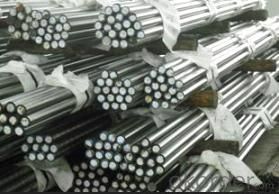
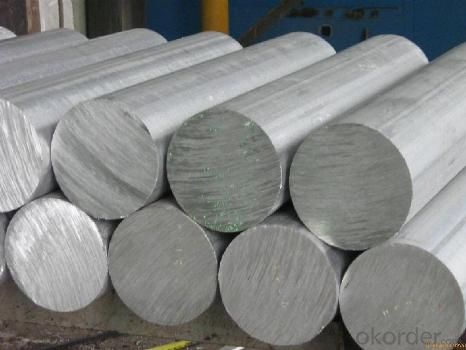
- Q: How does special steel perform in radiation shielding applications?
- Special steel is an excellent choice for radiation shielding applications due to its high density and ability to absorb and scatter radiation effectively. Its unique composition and properties allow it to provide a strong barrier against various types of radiation, ensuring the safety of individuals and equipment in radiation-prone environments.
- Q: What are the requirements for special steel used in cryogenic applications?
- To ensure optimal performance and reliability in extremely low-temperature environments, special steel employed in cryogenic applications must fulfill a range of prerequisites. First and foremost, the steel must exhibit exceptional low-temperature toughness, enabling it to endure the extreme cold without succumbing to brittle fracture or compromising its mechanical properties. It is imperative that the steel possesses high toughness and ductility to effectively absorb impacts and prevent cracking. Moreover, the steel must possess a low coefficient of thermal expansion. This characteristic assumes significance as cryogenic applications involve substantial temperature fluctuations. A high coefficient of thermal expansion can result in dimensional instability and stress within the material. Conversely, a low coefficient of thermal expansion mitigates these effects and maintains dimensional stability. Furthermore, the steel should demonstrate low thermal conductivity. Given that cryogenic applications often entail the transfer or storage of substances at extremely low temperatures, minimizing heat transfer is essential. A low thermal conductivity aids in maintaining the desired temperature and prevents unwanted heat exchange. This aspect is particularly critical in applications where precise temperature control is paramount, such as the storage of liquefied gases. In addition, the steel must exhibit excellent corrosion resistance. Cryogenic environments can be highly corrosive, necessitating the steel's ability to withstand the detrimental effects of corrosive substances that may be present. This attribute is particularly vital in applications involving the storage or transportation of cryogenic liquids or gases. Finally, the steel should possess good weldability. Welding is often necessary to join different components or sections of the steel in cryogenic applications. Therefore, ensuring the steel's weldability is crucial to establish strong and reliable joints. In summary, the requirements for special steel used in cryogenic applications encompass exceptional low-temperature toughness, a low coefficient of thermal expansion, low thermal conductivity, excellent corrosion resistance, and good weldability. Satisfying these requirements guarantees the steel's ability to withstand the harsh conditions and extreme cold of cryogenic environments while preserving its structural integrity and performance.
- Q: Can special steel be used in the production of jewelry?
- Indeed, it is possible to utilize special steel in the fabrication of jewelry. While precious metals such as gold, silver, and platinum are frequently employed in the art of jewelry making, there is an emerging inclination towards incorporating unconventional materials like special steel. The distinctive attributes of special steel, namely its durability, strength, and resistance to corrosion, allow for the creation of exquisite and intricate designs that cater to a contemporary and bold aesthetic. Moreover, special steel jewelry often presents a more economical alternative to traditional precious metal jewelry, rendering it a favored choice for individuals seeking a distinctive and budget-conscious option. Nevertheless, it is crucial to bear in mind that special steel jewelry necessitates proper care and maintenance to prevent tarnishing and scratching.
- Q: How does quenching and tempering affect the hardness of special steel?
- Quenching and tempering significantly impact the hardness of special steel. Quenching involves rapidly cooling the steel from a high temperature, which results in a hard and brittle structure. On the other hand, tempering involves reheating the quenched steel to a specific temperature and then cooling it slowly, which reduces the brittleness and increases the toughness of the steel while maintaining a desired level of hardness. Overall, this heat treatment process modifies the microstructure of the steel, leading to a controlled increase in hardness while improving its mechanical properties.
- Q: What are the different methods of surface protection for special steel?
- There are several methods of surface protection for special steel, including galvanizing, painting, powder coating, electroplating, and hot-dip coating. Each method offers different advantages and is suitable for various applications based on factors such as corrosion resistance, durability, aesthetics, and cost-effectiveness.
- Q: What is the cost of special steel compared to other materials?
- The price of special steel can vary depending on various factors when compared to other materials. Special steel, also known as alloy steel or tool steel, is generally more expensive than regular carbon steel due to its superior properties and composition. Its strength, durability, and resistance to wear and corrosion make it ideal for specialized applications in industries like automotive, aerospace, and construction. In comparison to non-ferrous metals like aluminum or copper, special steel often has a lower cost. However, it is important to note that different types of special steel can have different price ranges. For example, stainless steel, which contains chromium and other elements for better corrosion resistance, tends to be pricier than carbon steel. When comparing the cost of special steel to materials like plastics or composites, it is crucial to assess the specific project requirements. While these alternatives may have lower initial costs, they may not possess the same level of strength, heat resistance, or durability as special steel. Therefore, the long-term benefits and savings offered by special steel, such as reduced maintenance, longer lifespan, and improved performance, should also be considered. Ultimately, the price of special steel compared to other materials is influenced by factors such as the type and grade of steel, market demand, quantity needed, and any additional processing or finishing required. Consulting with suppliers, considering the specific application requirements, and conducting a comprehensive cost-benefit analysis will help determine the most suitable and cost-effective material choice for a particular project.
- Q: How long does special steel last compared to regular steel?
- Due to its unique composition and properties, special steel tends to have a longer lifespan than regular steel. Regular steel primarily consists of iron and carbon, while special steel is alloyed with elements like chromium, nickel, and molybdenum to enhance its strength, hardness, and resistance to corrosion. The lifespan of special steel is influenced by factors such as the specific type of steel, its usage conditions, and maintenance practices. However, in general, special steel has a significantly longer lifespan compared to regular steel. It exhibits greater resistance to wear and tear, corrosion, and high temperatures, making it suitable for demanding applications and environments. Industries such as aerospace, automotive, and construction extensively utilize special steel for critical components like engine parts, structural elements, and cutting tools. These components often endure high stress, friction, and exposure to harsh conditions. Special steel's exceptional properties enable it to withstand these challenges and maintain its performance for an extended period. Furthermore, special steel undergoes rigorous testing and quality control measures during its manufacturing process. This ensures that it meets specific industry standards and can endure extreme conditions without significant degradation. In contrast, regular steel may not possess the same level of durability or longevity. In conclusion, special steel generally lasts longer than regular steel due to its enhanced properties and resistance to wear, corrosion, and high temperatures. Although the exact lifespan may vary depending on various factors, special steel's superior characteristics contribute to its prolonged durability.
- Q: How does special steel contribute to the mining aftermarket industry?
- Special steel plays a crucial role in the mining aftermarket industry by offering enhanced durability, strength, and resistance to extreme conditions. This type of steel is specifically designed to withstand the demanding environments and heavy loads associated with mining operations. In the mining aftermarket industry, special steel is used to manufacture various equipment and components, such as drill bits, cutting tools, crusher parts, and wear plates. These components are subject to intense wear and tear due to the abrasive nature of the materials being mined. Special steel, with its superior hardness and toughness, ensures that these components can withstand the harsh conditions and maintain their performance over an extended period. Furthermore, special steel allows for the development of more efficient and productive mining equipment. By using high-strength steel alloys, manufacturers can design lighter equipment without compromising on strength and durability. This results in increased productivity and reduced operating costs for mining companies. Special steel also contributes to the safety of mining operations. The robustness and reliability of steel components minimize the risk of unexpected failures, which can lead to accidents and downtime. Additionally, special steel can withstand extreme temperatures, corrosion, and other environmental factors commonly encountered in mining, reducing the need for frequent replacements and repairs. In summary, special steel is essential to the mining aftermarket industry as it provides the necessary strength, durability, and resistance to extreme conditions required for mining equipment and components. It enhances productivity, reduces operating costs, and ensures the safety of mining operations, making it a critical material in the mining industry.
- Q: What are the main applications of special steel?
- The main applications of special steel include the manufacturing of tools, machinery, and equipment used in industries such as automotive, aerospace, construction, and energy. It is also widely used in the production of cutlery, surgical instruments, and various components for infrastructure and engineering projects. Special steel's properties, such as high strength, corrosion resistance, and heat resistance, make it indispensable in these sectors where durability, reliability, and performance are crucial.
- Q: What are the different aerospace grades of special steel?
- Some of the different aerospace grades of special steel include 15-5PH, 17-4PH, 300M, 4130, 4340, 440C, and H11. These grades are specifically designed to meet the high-performance requirements of the aerospace industry, providing excellent strength, corrosion resistance, and heat resistance properties.
Send your message to us
Forged Spring Steel Round Bar with the Size 20mm
- Loading Port:
- Shanghai
- Payment Terms:
- TT or LC
- Min Order Qty:
- 20 m.t.
- Supply Capability:
- 500 m.t./month
OKorder Service Pledge
OKorder Financial Service
Similar products
Hot products
Hot Searches
Related keywords
